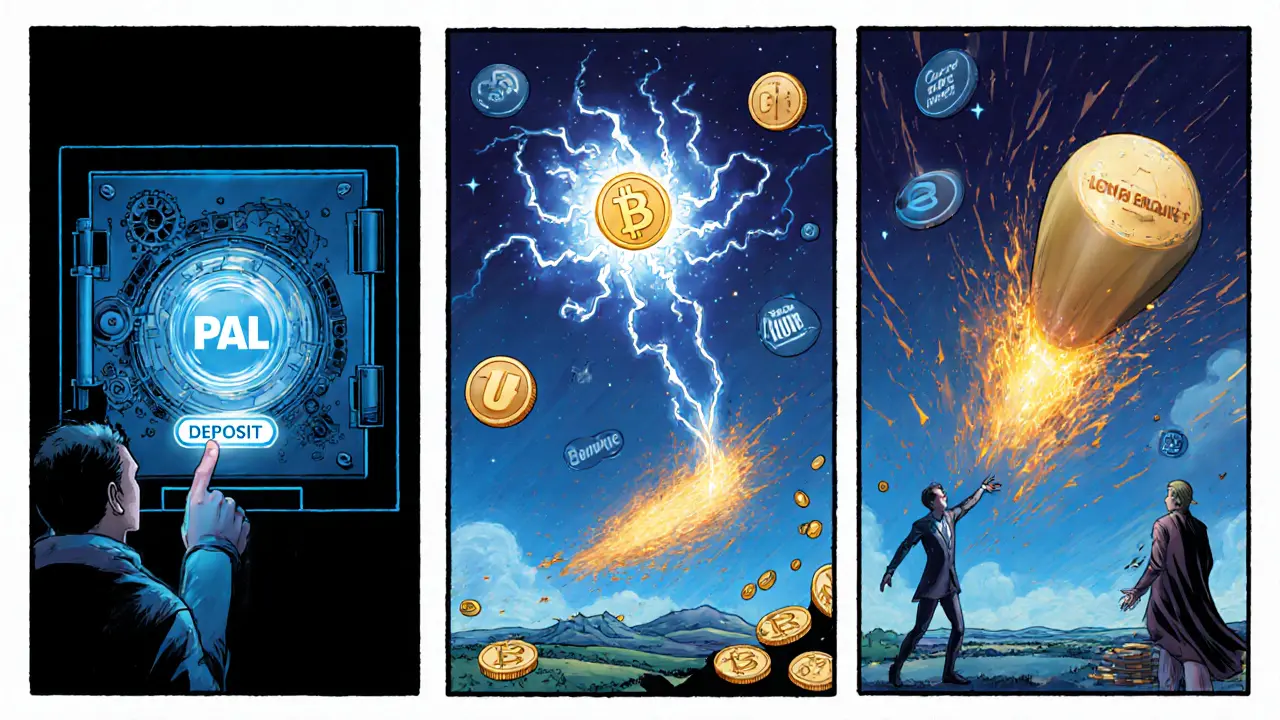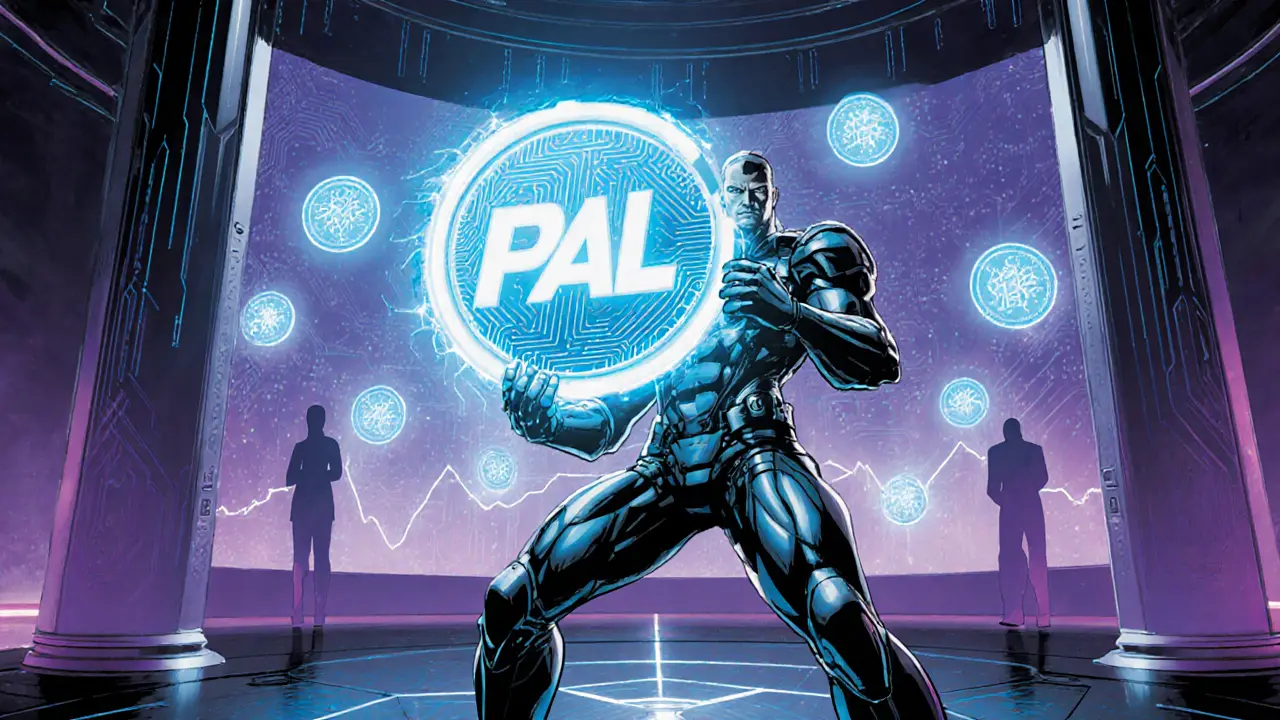Paladin (PAL) Governance Lending Calculator
Paladin (PAL) allows you to tokenize your governance rights and earn yield by lending them. Calculate how much you could earn by lending your governance tokens below.
Earned PAL: 0.0000
Estimated Value: $0.00
Effective Annual Yield: 0.00%
With {amount} governance tokens, lending at {rate}% annual interest for {days} days, you could earn approximately {pal} PAL tokens worth ${value}, representing an effective annual yield of {yield}.
Important Note
This calculator provides estimates only. Actual earnings depend on market conditions, protocol fees, and other factors. Always review the latest information on Paladin's official documentation before making any decisions.
Ever wondered how a voting right can turn into a liquid asset? Paladin (PAL) is a decentralized governance‑lending token that lets holders borrow or loan voting power while still taking part in DAO decisions. In plain English, PAL gives you two jobs at once: you keep your voice in a decentralized autonomous organization (DAO) and you earn yield on that same voice. Below we break down the idea, the tech, the market numbers and the risks so you can decide whether PAL belongs in your crypto toolbox.
What Exactly Is Paladin (PAL)?
Paladin is built around a single premise: voting power shouldn’t sit idle between proposal cycles. The protocol lets you tokenize your governance rights, turn them into a tradable asset, and then lend that asset to others who need voting weight. When you lend, you receive interest in PAL; when you borrow, you pay interest but gain immediate voting influence.
This model creates what the team calls a “money lego” - a modular piece of value that can be combined with other DeFi blocks. The token itself, PAL, is the native utility and governance token of the protocol.
How Governance Lending Works
Imagine you hold 1,000 UNI tokens that give you voting rights in the Uniswap DAO. Normally you’d either vote during the snapshot or let the tokens sit idle. With Paladin you can lock those UNI voting rights into a smart contract, receive PAL tokens that represent the locked vote, and then lend those PAL tokens to a borrower who wants extra voting weight for an upcoming proposal. The borrower pays you a fee (usually a few basis points), and you still retain the ability to claim the original UNI vote back once the borrowing period ends.
The process can be visualized as three steps:
- Deposit governance token: Send your token to Paladin’s non‑custodial vault.
- Mint PAL: The protocol issues PAL that mirrors the voting power you deposited.
- Lend or borrow PAL: Lenders earn yield; borrowers gain immediate voting muscle.
Because the vault is non‑custodial, you retain cryptographic control over your assets at all times - a key differentiator from centralized delegation services.
Technical Architecture & Core Features
Paladin runs on the Ethereum the leading smart‑contract platform for DeFi applications. The core contracts handle three functions:
- Transferability: PAL tokens can be moved across wallets, listed on DEXes, or used as collateral.
- Liquidity‑Bootstrapped Events (LBEs): These events seed initial liquidity without relying on centralized market makers.
- Flywheel incentives: Rewards are automatically distributed to lenders, boosting long‑term participation.
Security audits have been performed, but detailed audit reports are not publicly archived. The protocol is designed to integrate with existing DAO frameworks, meaning any token that follows the ERC‑20 standard can be wrapped and lent through Paladin.
Market Data Snapshot (as of October42025)
Below is the most recent on‑chain and exchange information:
- Current price: ~$0.06591 on Bybit (prices vary between $0.0658 and $0.1159 across venues).
- Market cap: between $1.27M and $2.22M depending on the source.
- Circulating supply: 19.18M PAL.
- 24‑hour volume: $221‑$2,136 (liquidity is modest, with the PAL/WETH pair handling 62% of total volume).
- Rank: #2602‑#3960 among all cryptocurrencies.
Price volatility is typical for a sub‑$5M market cap project. The 24‑hour low/high on Bybit hovered around $0.0650‑$0.0673, while a weekly trough hit $0.0731 on Saturday.

Where Can You Trade PAL?
PAL is listed on four main DEXes:
- Uniswap (v3) Ethereum‑based automated market maker
- Curve Stable‑swap DEX focused on low slippage
- Shadow Exchange Emerging DeFi aggregator
- Balancer Portfolio‑balancing DEX
Bybit also offers PAL trading for those who prefer a more centralized interface; Level1 identity verification is required.
Funding Round & Backers
Paladin raised roughly $2.55M in its initial coin offering (ICO). The token sale sold 7.95M PAL to investors. Notable venture capital firms that participated include:
- Galaxy Tier‑1 crypto‑focused VC
- Greenfield Capital (Tier‑2)
- NFX (Tier‑4)
- Semantic Ventures (Tier‑4)
The presence of Galaxy signals strong institutional confidence, but the relatively small raise underscores the niche nature of the governance‑lending market.
Paladin vs. Traditional Governance Tokens
| Feature | Paladin (PAL) | Standard Governance Token |
|---|---|---|
| Liquidity of voting power | Tokenized and tradable via PAL | Typically illiquid until a vote occurs |
| Yield generation | Lending fees paid in PAL | None (unless staked in separate farms) |
| Non‑custodial control | Users retain private keys | Often requires delegation to a custodian |
| Exposure to market risk | Both PAL price volatility and underlying token risk | Only underlying token volatility |
| Complexity | Requires understanding of lending contracts | Simple hold‑and‑vote model |
The table shows why PAL might appeal to active DeFi participants: you can earn while you wait for the next governance proposal.
Risks & Investment Considerations
Before allocating capital, weigh these factors:
- Low liquidity: Small 24‑hour volumes can cause slippage on larger trades.
- Market‑cap concentration: A $2M cap means price swings are amplified by modest buying pressure.
- Protocol risk: Smart‑contract bugs could lock voting power or funds.
- Adoption risk: Paladin’s value hinges on the broader uptake of DAO governance and the willingness of token holders to lend their votes.
- Regulatory uncertainty: Governance‑lending blurs the line between a security and a utility token in some jurisdictions.
Technical analysis platforms such as 3Commas currently flag PAL with a “Buy” recommendation, projecting short‑term levels around $0.06. However, those models often ignore liquidity constraints and protocol‑specific risks.
How to Get Started with Paladin
- Set up a compatible Ethereum wallet (e.g., MetaMask).
- Acquire PAL on a listed DEX or through Bybit after completing KYC.
- If you hold a governance token, approve the Paladin vault to lock your tokens.
- Mint PAL and choose to lend (earn) or borrow (gain voting power).
- Monitor your position via the Paladin dashboard - watch interest rates and voting deadlines.
For borrowers, keep an eye on the repayment schedule; defaulting could mean losing the borrowed voting rights and incurring penalties.

Frequently Asked Questions
What does PAL stand for?
PAL is the ticker symbol for the Paladin governance‑lending token. It doesn’t represent an acronym; it’s simply the chosen short name for the cryptocurrency.
Can I vote while my token is locked in Paladin?
Yes. When you lock a governance token, Paladin issues PAL that carries the same voting weight. You can either vote directly with PAL or lend it out and receive interest, but the underlying voting right remains attributable to you.
Is PAL a high‑risk investment?
PAL is considered high‑risk due to its small market cap, limited liquidity, and reliance on DAO adoption. Investors should only allocate a portion of their portfolio they can afford to lose.
Where can I buy PAL?
PAL trades on decentralized exchanges like Uniswap v3, Curve, Shadow Exchange, and Balancer. Centralized platforms such as Bybit also list PAL for fiat and crypto deposits.
How does Paladin differ from other vote‑delegation services?
Traditional delegations simply pass voting rights to another address, often without compensation. Paladin tokenizes those rights, allowing owners to earn yield while still maintaining a claim on the original vote.


Jim Griffiths
October 4, 2025 AT 08:19Paladin (PAL) is a governance token that lets holders lock up voting power for a share of protocol revenue.
The token can be deposited into Paladin’s lending module, which then lends the token to borrowers who need voting influence.
In return, lenders earn a portion of the interest that borrowers pay on the borrowed governance rights.
The annual interest rate shown in the calculator is a projection based on recent protocol data and can change as market conditions shift.
To use the calculator you simply input the amount of PAL you plan to lend, the current APR, the number of days you expect to keep the position, and the current market price of PAL.
The tool then multiplies the principal by the daily rate (APR divided by 365) and by the number of days, giving you an estimated PAL reward.
It also multiplies that reward by the price you entered to show an estimated dollar value.
Keep in mind that the “effective annual yield” field annualizes the daily return you would get if you kept the same rate for a full year.
This number is useful for comparing PAL lending to other crypto yield products, but it is not guaranteed.
The actual return can be lower if the protocol adjusts fees, if borrowers default, or if the PAL price drops.
Likewise, if the protocol introduces incentives or the market demand for governance rights spikes, you could earn more than the calculator predicts.
Because PAL is a governance token, lending it also means you temporarily give up your voting power, which could affect proposals you care about.
Some users choose to only lend a portion of their holdings to keep a voting buffer.
Another strategy is to lend when the APR spikes after a major governance event, then withdraw once the rate normalizes.
Always double‑check the latest Paladin documentation and community forums before committing large amounts.
In short, the calculator is a helpful starting point, but treat the numbers as estimates, not a promise.
Cynthia Rice
October 8, 2025 AT 22:23The drama of lending your voice for silent profit is pure poetry.
Promise Usoh
October 13, 2025 AT 12:26Whilst the Paladin framework presents a novel avenue for tokenised governance, one must consider the inherent risks associated with delegating voting authority to a third‑party lending mechnism.
The calculator provides a convenient estimate, yet the dynamic nature of protocol fees and market volatility can render those figures obsolete within hours.
Tyrone Tubero
October 18, 2025 AT 02:30Yo, if u think PAL lending is just some side hustle, u clearly dont get the deep economic ballet behind tokenised vote power.
Taylor Gibbs
October 22, 2025 AT 16:33Look, folks, lending your PAL can be a cool way to earn passive income, but make sure you keep some tokens handy for voting on proposals you care about.
It’s all about balance, and the community vibes are stronger when we all stay engaged.
Rob Watts
October 27, 2025 AT 05:36Give it a shot if the APR looks good keep an eye on the market don’t overcommit
Bhagwat Sen
October 31, 2025 AT 19:40Honestly, you should just dump all your governance tokens into the lending pool right now the rates are insane and nobody’s gonna stop you.
mukesh chy
November 5, 2025 AT 09:43Oh sure, because relying on a brand‑new lending protocol is exactly what every seasoned investor does when they’re bored of actual research.
Eva Lee
November 9, 2025 AT 23:46From a DeFi engineering standpoint, the PAL lending module leverages a smart‑contract‑based escrow that tokenises vote escrow (vePAL) and offers an APR that’s a function of protocol fee accrual and liquidity demand.
Users should monitor the on‑chain metrics like total vePAL supply and fee distribution ratios to optimise yield.
Jenise Williams-Green
November 14, 2025 AT 13:50It is morally reprehensible to chase yield without considering the democratic erosion that comes from surrendering your voting rights.
We must ask ourselves whether short‑term profit justifies long‑term governance decay.
Kortney Williams
November 19, 2025 AT 03:53I think the calculator is a useful tool for getting a rough idea of earnings, but I’d also recommend checking out the official Paladin docs and community discussions before making a big move.
Laurie Kathiari
November 23, 2025 AT 17:56Yo, the PAL yield game is like a rollercoaster – exhilarating, risky, and totally worth the scream if you’re strapped in right.
Cathy Ruff
November 28, 2025 AT 08:00Do not trust the calculator it’s just a glorified spreadsheet and you’ll lose money if you follow it blindly